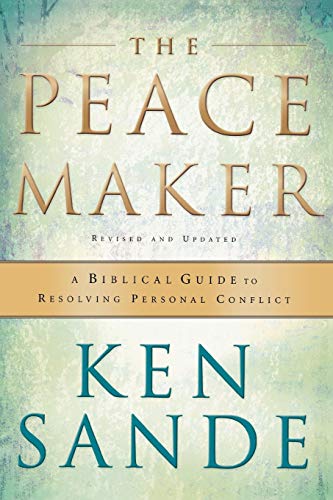Quotes about Conflict-Resolution
If you have been putting off going to another person to try to achieve reconciliation with him, you have wronged him.
Jesus won’t allow the unreconciled condition to continue among believers. In Matthew 5, if another considers you to have wronged him, Jesus says that you must go. In Matthew 18, He says that if the other person has done something wrong to you, you must go. There is never a time when you can sit and wait for your brother to come to you. Jesus doesn’t allow for that. He gives no opportunity for that. It is always your obligation to go.
He that is not a son of Peace is not a son of God. All other sins destroy the Church consequentially; but Division and Separation demolish it directly.
We must take the initiative to restore peace. Jesus taught that it makes no difference whether you have wronged your brother or he has wronged you. Either way, you are always responsible to initiate efforts toward peace (see Matthew 5:23-24 and 18:15). If we are serious about intently pursuing peace, we won’t be concerned about which of us is the offending party. We will have one goal: To restore peace in a godly manner. Unresolved conflict between believers is sin and must be treated as such; otherwise, it will spread throughout the body like cancer until it requires radical spiritual surgery. Far better to deal with it when it is easily contained.
The Practice of Godliness, NavPress, 1996, p. 164. Used by permission of NavPress – www.navpress.com. All rights reserved. Get this book!
Asking for forgiveness from others in a scriptural manner involves acknowledging that you have sinned against them and that you desire mercy and pardon (not to be given what you deserve). Asking for forgiveness is vital for reconciliation and may lead to the difference in the relationship.
Self-Confrontation Manual, Lesson 12, Page 6, Used by Permission of the Biblical Counseling Foundation.
The difference in result between forgiveness that responds to repentance and forgiveness independent of the repentance of the offending party is, of course, that the former pattern issues in reconciliation while the latter does not. But in both cases what is presupposed is that the believer forgives the offender. Transparently, reconciliation is a good thing if it can be achieved, but the goal of reconciliation should not become the cloak for nursing bitterness because it cannot be achieved.
Love and Forgiveness by D.A. Carson taken from Love in the Hard Places by D.A. Carson, 2002, Crossway Books, a division of Good News Publishers, Wheaton Illinois 60187, www.crosswaybooks.org. Page 82.
To put a wall between you and others is to build a wall between you and God.
Returning to Your First Love, Christian Communicators Worldwide, www.CCWtoday.org. Used by Permission.
God’s peace does not peacefully coexist with falsehood, sham, or injustice; so Gods’ peacemakers cannot simply ignore peace-destroying sin and error, any more than a surgeon can simply close up an infection wound: an abscess is bound to develop.
The New Testament makes it clear that no church is exempt from conflict. Yet this very friction offers opportunities for interpersonal and spiritual growth. To assist in such growth, Jesus sanctioned the work of a peacemaker (Mat. 5:9). In this vein, Jesus is the ultimate role model (Eph. 2:14-18). Since mediation is a God-ordained pattern (1 Tim. 2:5), all Christians in conflict ought to adopt God’s pattern for making peace as a reflection of their shared faith (Phil. 4:2-3).
How should we repent when rightly rebuked? In four ways: 1. “I was wrong.” Plain, honest, no evasions. 2. “I am sorry.” Brokenhearted, realizing the damage done. 3. “It won’t happen again.” Rebuilding trust for the future. 4. “Is there anything I can do to make it up to you?” Performing deeds in keeping with repentance (Acts 26:20; Matthew 3:8).
The gospel being what it is and always will be, “the message of reconciliation” (2 Corinthians 5:19), our churches should be the most reconciling, peaceable, relaxed, happy places in town. We are so open to enemies, so meek in the face of insults and injuries, so forgiving toward the undeserving — if we do make people angry, let this be the reason. We refuse to join in their selfish battles. We’re following a higher call. We are the peacemakers, the true sons of God (Matthew 5:9).
Where once there was trust, with joy, honesty and spontaneity, now there might be aloofness, guardedness, even resentment. To make matters worse, attempts at reconciliation can be ignored or even refused. That is when, it seems to me, it is time to turn away. Turning away is not our first response, of course. But it must be a valid, if undesirable, option. After all, we can’t force people to be open, to talk, to reconsider. Until the Holy Spirit changes hearts — I have reluctantly concluded that there really is a time to turn away. Yes, it is a defeat for the gospel. But what else can one do? All that’s left is trusting the Lord, referring the matter to the judgment seat of Christ, who alone sees all things perfectly… Sometimes all one can do is not make a situation worse. That’s hard. But the Lord can do amazing things with brokenhearted people who have nothing left but a longing for His glory in this messy world.
7 A’s of Confession:
1. Address everyone involved and only them. Talk to them about my faults. Do it right away and be persistent. Only talk to people who are part of the problem or part of the solution.
2. Avoid “if”, “but”, “maybe”. That’s just blaming the other party and finding fault with them for my own failure. “If I offended you”, “Maybe I was wrong”, “If you hadn’t said that”, “I’m sorry, but you..”
3. Admit specifically what you did, when possible.
4. Apologize – express your sorrow for your sin
5. Ask for forgiveness. Most people leave this out. The other party might be 99% wrong, but this isn’t about them right now. It’s about your own log.
6. Accept the consequences. Make restitution. It’s what you ought to do. Don’t demand that they pretend nothing happened.
7. Alter your behavior. You won’t be perfect, but you’ll get better. Repent before God (Robert Williams).
How to Turn a Disagreement into a Feud:
1. Be sure to develop and maintain a healthy fear of conflict, letting your own feelings build up so you are in an explosive frame of mind.
2. If you must state your concerns, be as vague and general as possible. Then the other person cannot do anything practical to change the situation.
3. Assume you know all the facts and you are totally right. The use of a clinching Bible verse is helpful. Speak prophetically for truth and justice; do most of the talking.
4. With a touch of defiance, announce your willingness to talk with anyone who wishes to discuss the problem with you. But do not take steps to initiate such conversation.
5. Latch tenaciously onto whatever evidence you can find that shows the other person is merely jealous of you.
6. Judge the motivation of the other party on any previous experience that showed failure or unkindness. Keep track of any angry words.
7. If the discussion should, alas, become serious, view the issue as a win/lose struggle. Avoid possible solutions and go for total victory and unconditional surrender. Don’t get too many options on the table.
8. Pass the buck! If you are about to get cornered into a solution, indicate you are without power to settle; you need your partner, spouse, bank, whatever (Ron Kraybill).
Peacemakers carry about with them an atmosphere in which quarrels die a natural death (Roddy Archibald).
There’s no gridlock with God…no stalemate…no tie game. If a husband and wife have talked things out, but cannot come to agreement on a matter, the Bible teaches that the husband’s authority prevails. By divine design God has entrusted to the husband leadership and authority with which to wisely and lovingly rule the household. The husband is not guaranteed the smartest decisions–but God does expect him to exercise leadership in the home and to have the power to veto (break up an impasse with his vote). However, this does not give him the right to be arrogant and to flaunt his authority, or to run roughshod over other family members’ feelings. He has no right to refuse to listen to his wife, to withdraw from confrontational discussions, to act in anger, or to act in a non-understanding way (1 Peter 3:7). He has no right to exasperate his children or anyone else in the family. He must love his wife even as Christ loves the church and gave Himself up for it. Because of the Biblical doctrine of ‘male headship,’ I place (and I believe God places) the brunt of the responsibility for family growth, happiness, and harmony, upon the husband. Since he is the one entrusted with leadership, he is the one chiefly responsible for leading the family towards the goal of Christlikeness (Peter Wise).
Rebuilding trust is much harder than building it. After conflict and separation, after two people have so seriously injured each other, even after apologies have been made, restoring spontaneity and carefree affection doesn’t happen overnight (Marshall Shelly).
Ministering to Problem People in Your Church, Bethany House Publishers, 2013, p. 38. Used by Permission.
Whenever there is conflict, you should use email: 1. If there needs to be a record of the interaction. 2 If you are dealing with a conflict where the emotional level is fairly low. 3. If you can be gracious and not upset as you’re drafting your reply. 4. If you’re having an initial conversation to set up a phone call or face to face meeting to address things in more detail. Do not use email: 1. If you’re in conflict with someone you’ve never met face-to-face. 2. Your emotions are running high. 3 If the email exchange has gone back and forth more than three times. This could mean that the issue is too complex to deal with using only email. Ask to speak by phone or face-to-face (Marshall Shelly).
Ministering to Problem People in Your Church, Bethany House Publishers, 2013, p. 86. Used by Permission.
A profound understanding and fear of God’s wrath is exactly what many [people] need, because without it, the gospel is diluted down to mere human relations and loses its biblical glory. Without a biblical view of God’s wrath, you will be tempted to think that your wrath – your anger – against your [enemy] is simply too big to overcome, because you have never really tasted what it is like to see an infinitely greater wrath overcome by grace, namely, God’s wrath against you.
This Momentary Marriage – A Parable of Permanence, Desiring God Foundation, 2008, p. 44-45, www.DesiringGod.org.
Don’t equate peacemaking with peace-achieving. A peacemaker longs for peace, and works for peace, and sacrifices for peace. But the attainment of peace may not come. Romans 12:18 is very important at this point. Therefore Paul says, “If possible, so far as it depends upon you, live peaceably with all.” That is the goal of a peacemaker: “If possible, so far as it depends on you…” Don’t let the rupture in the relationship be your fault.
Blessed are the Peacemakers, Sermon: Matthew 5:9, March 9, 1986, www.DesiringGod.org. Used by Permission.
There is such a big difference between forgiveness and reconciliation. It takes two to reconcile, so it is not always possible to be reconciled. But it takes only one to forgive. So if people do you wrong, forgive them, whether or not they ask for forgiveness. You cannot cancel their sin. Only God can do that, and He will only do it if they repent. But what you can do is set aside your own anger, bitterness, and resentment towards them.
As We Forgive Our Debtors from When You Pray by Philip Graham Ryken, © 2000, Crossway Books, a division of Good News Publishers, Wheaton Illinois 60187, www.crosswaybooks.org, page 141.
To truly overlook an offense means to deliberately decide not to talk about it, dwell on it, or let it grow into pent-up bitterness. If you cannot let go of an offense in this way, if it is too serious to overlook, or if it continues as part of a pattern in the other person’s life, then you will need to go and talk to the other person about it in a loving and constructive manner.
Reprinted from The Peacemaker: A Biblical Guide to Resolving Personal Conflict, Ken Sande, Baker Books, 3d ed., 2004, p. 83. Peacemaker® Ministries. www.Peacemaker.net . Used by Permission. Get this book!
Good listening is particularly important for a peacemaker. It improves your ability to understand others, it shows that you realize you do not have all the answers, and it tells the other person that you value his or her thoughts and opinions. Even if you cannot agree with everything others say or do, your willingness to listen demonstrates respect and shows that you are trying to understand their perspective.
Reprinted from The Peacemaker: A Biblical Guide to Resolving Personal Conflict, Ken Sande, Baker Books, 3d ed., 2004, p. 165. Peacemaker® Ministries. www.Peacemaker.net . Used by Permission. Get this book!
Do all you can to be reconciled to others, but remember that you cannot force others to do what is right. If you have done everything within your power to resolve a conflict, you have fulfilled your responsibility to God and may stop actively trying to solve the problem (Rom. 12:18)… It is not necessary or wise to waste time, energy, and resources fretting about someone who stubbornly refuses to be reconciled.
Reprinted from The Peacemaker: A Biblical Guide to Resolving Personal Conflict, Ken Sande, Baker Books, 3d ed., 2004, p. 252. Peacemaker® Ministries. www.Peacemaker.net . Used by Permission. Get this book!
One of the things that can help very different spouses the most (in conflict resolution) is growth in God’s Word. The more we have God’s Word in common as husbands and wives, the more we will agree. The more each mind is renewed (changed) by the Scripture, the more similarly a couple will think (Romans 12:2). One of the worst things a couple can do is work to change one another into each other’s likeness. They are to be changed, rather, into Christ’s likeness. The more a couple works at love and becoming one, the more differences will be accepted and blended to enhance the marriage.
The Exemplary Husband, Focus, 2000, p. 244. Get this book!
When we seek to run away from our conflicts through the escape tactics, we fail to trust God and prefer the other individual. These “natural” responses are unbiblical, unloving, unproductive and unacceptable.
Escape responses focus on “me” and make me a “peace-faker.” Attack responses focus on “you” and make me a “peace-breaker.” But peacemaking responses focus on “God” and make me a “peace-maker.”
Peacemaking suggestions when seeking conflict resolution with another: Pray before, during and after the time together (1 Thes. 5:17). Get together and talk about the matter face-to-face (i.e. not an email). Be sure to go to the individual in a loving and reasonable and gentle manner (1 Cor. 4:21; Eph. 4:2; 1 Tim. 6:11). Make sure your heart is right. Make sure you have removed the log from your own eye before you seek to remove the speck from your brother’s (Mt. 7:3-5). Go seeking to believe the best, hear the other side of the story (Pr. 18:17). Attack the problem not the person, value the relationship more than the issue. Deal with one problem at a time. Find common ground – I hope as Christians you both want God’s glory and unity – start there (1 Cor. 10:31)! Add how you may have contributed to the problem – people will always listen to how you might have wronged them (Pr. 28:13). Be prepared to extend and receive forgiveness if appropriate (Eph. 4:32; Col. 3:13). Seek to fully reconcile the relationship and put the matter behind you. Remember, there is a big difference between forgiveness and reconciliation.
Sermon, Zealous for Peace, Romans 14:19, May 19, 2019.|Sermon, Zealous for Peace, Romans 14:19, May 19, 2019.
To solve a marriage problem, you have to talk with each other about it, choosing wisely the time and place. But when accusations and lengthy speeches of defense fill the dialogue, the partners are not talking to each other but past each other. Take care to listen more than you speak. If you still can’t agree on a solution, consider asking a third party, without a vested interest, to mediate.
If you are drawn into a controversy, use very hard arguments and very soft words.
Our love ought to follow the love of God in one point, namely, in always seeking to produce reconciliation. It was to this end that God sent His Son.
When facing a conflict, the first and most important thing to remember is this: Be Spirit-controlled, not out of control.
Leading With Love, Lewis and Roth, 2006, p. 166, Used by Permission. Get this book!
Time heals things. We’ve heard that many times. And occasionally it is true that people’s emotions die down and they lose the heart to disagree or fight. But to depend on time alone in the body of Christ to mend church problems is a very dangerous path. More often than not the problems only fester, become more serious, and then explode.
Practical Wisdom for Pastors, Crossway Books, 2001, p. 130. Used by Permission. Get this book!
Constructive and Destructive Approaches to Conflict:
Raises & clarifies issues vs. Brings up old issues. Expresses both positive & negative feelings vs. Expresses only negative feelings. Complete and honest information vs. Selective information. Conflict focuses on issue vs. Conflict focuses on person. Accepts mutual blame vs. Blames other person(s) for problem. Focuses on similarities vs. Focuses on differences. Facilitates change to prevent stagnation vs. Minimizes change, increasing conflict. Both win vs. One wins, one loses; or both lose Resolving conflict increases intimacy vs. Escalating conflict decreases intimacy.
God takes initiative and moves toward us; we take the initiative toward others.
Move Toward Others by Edward Welch taken from Caring for One Another by Edward Welch, copyright 2018, Crossway Books, a division of Good News Publishers, Wheaton Illinois 60187, www.crosswaybooks.org. Page 17.




















